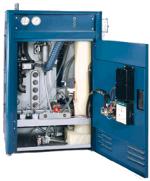Search engine visitors - click here to access entire "$ensible Home" web site
Click here to see a descriptive illustration of several designs of efficient boilers.
Dear Jim: We will need a heating system for a new room addition. I like the idea of using an efficient boiler, perhaps also for the entire house. Is hot water boiler heating effective for mild and moderate climates too? - Mike R.

A: Using a boiler with hot water heating is often associated with cold northern and northeastern homes. The truth is, it is becoming quite popular throughout all climates because of its superior comfort, high efficiency, silent operation, and reduction in indoor airborne allergies.
Although boiler design has lagged forced-air furnace design by several years, there now are condensing gas boilers in the 90-plus percent range and oil boilers up to 90 percent. Condensing gas boilers, similar to forced-air furnaces, vent outdoors through a small plastic pipe. No chimney is needed so converting from electricity to gas or propane is simpler now.
Anyone who has ever lived in a home with hot water heat will tell you the steady heat from floor radiators or cast iron radiators is extremely comfortable. Since there is no noisy blower switching on and off every several minutes, the home is quiet without gusts of hot or cold air.
If you now have a forced-air duct system and switch to a boiler, you can continue to use your central air conditioner. If you are building a new home or addition with a boiler, you have several central air-conditioning options such as ductless or mini-duct systems. In cool climates, consider one or two portable units.
There are several efficient technologies used for boilers. One uses the pulse gas burner design in a tall round unit which resembles a standard water heater. Another uses a multistage design with a recooling tower which preheats the incoming combustion air to squeeze out even higher efficiency.
The most efficient and comfortable gas/propane models use a modulating or two-stage gas valve. Computerized controls sense the outdoor, indoor and return/supply water temperatures to determine how much gas it must burn.
Most of these newest efficient boilers use a lightweight low-mass heat exchanger, often made of aluminum for strength and a long life (warranties up to 20 years). They are relatively small in size. Some new designs weigh less than 100 pounds for a 100,000 Btu/hour unit and can be shipped to your home.
Oil boilers do not use the condensing technology, but still attain efficiencies as high as 90 percent and often use high-mass heat exchangers. Oil burns hotter than gas, so higher efficiencies are available in non-condensing models.
Most boilers, gas or oil, offer optional built-in tankless water heaters. This is efficient during the winter and provides a nearly endless supply of hot water for morning showers.
Instant Download Update Bulletin No. 490 - buyer's guide of 13 super-efficient gas, propane and oil boilers, efficiency ratings, heating output capacities, dimensions, flue venting method (sealed, direct, natural), warranties, features, illustrations of several models, and a savings/payback chart.
Dear Jim: I am building a new two-story house. I like recessed lighting in the kitchen, but I have heard recessed lighting is not very efficient. How much more electricity will the recessed lights use? - Kathy J.
A: I assume your kitchen is on the first floor, so recessed lights should not be much less efficient than other light fixtures. They are less efficient only when installed in a ceiling under an attic where there may be air leakage around them and less insulation thickness.
In any recessed light fixture, use a reflector or PAR bulb which focuses the light beams downward. With a standard bulb, much of the light never gets out of the fixture.